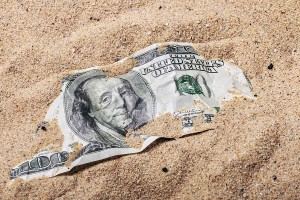Last month, it was reported that 300 American Fortune 500 corporations, such as Apple, Google and Microsoft, are holding approximately $2 trillion offshore and are avoiding paying more than half a billion dollars in United States taxes. Officials say if that money was brought home then it could help with the budget.
Kentucky Republican Senator and potential 2016 presidential candidate Rand Paul told CNBC on Tuesday that he is working with Senate Majority Leader Harry Reid on producing a so-called corporate tax holiday. This initiative would be targeted towards Untied States companies repatriating overseas profits.
 Details are still being discussed, but the purpose would prompt these companies to return to the U.S. and pay a tax rate that would stand below 10 percent. In addition, the revenues would be allocated to infrastructure and transportation projects, including constructing bridges and roads. If the plan is a success then it could generate $60 billion in revenue for Washington during the next three years.
Details are still being discussed, but the purpose would prompt these companies to return to the U.S. and pay a tax rate that would stand below 10 percent. In addition, the revenues would be allocated to infrastructure and transportation projects, including constructing bridges and roads. If the plan is a success then it could generate $60 billion in revenue for Washington during the next three years.
The Tea Party favorite complained that the proposal is being suppressed and criticized by the “traditional Washington mentality” that consists of either formulating comprehensive tax legislation or nothing at all.
“I think this is a win-win situation. Lower tax and bring in more revenue,” Paul told the business news outlet’s “Squawk Box” this week. “For the four years I’ve been here, we’ve gotten nothing. I say break this baby up into small pieces. Do this on the transportation bill in the next three weeks, and we’ll do something that Republicans and Democrats both like: Lower a tax, bring in more revenue and build more roads.”
This isn’t the first time that Paul, who entered federal politics in early 2011, has suggested a revision to the tax system. For instance, in April, the Kentucky senator recommended a flat tax that would be paid by everybody regardless of what income bracket they’re in. Although the percentage has yet to be determined, he cited anywhere between 15 and 18 percent and the regular deductions and exemptions would remain intact.
“What you’d have is an attrition if not an outright elimination of the IRS because it would be so simple that people would comply, and it would be very simple to know whether they complied or not,” Paul told Fox News last summer.
Others who urge a revamp of the tax code are calling for the FairTax, a general consumption tax of 23 percent. This would eliminate all other forms of taxes, including the income tax, corporate tax, capital gains tax and others.
Libertarian critics have lambasted both proposals. The Mises Institute’s Laurence M. Vance argued that a flat tax system would prompt the government to simply raise the tax over time, it hurts the most vulnerable in society and it remains to be coercive. The same concerns can be identified with the FairTax.
In 2009, Eric Staib wrote on the Mises website:
“As if this weren’t enough, not only do all consumers face higher prices for everything, but the introduction of a VAT would tend to distort market signals of consumers’ preferences between certain categories of goods. In the form of higher prices for highly-processed goods, a VAT sends entrepreneurs a phony signal that consumers prefer goods of high processing over those of low processing more strongly than they actually do. This is similar to Mises’s teaching that a central bank’s credit expansion, when not supported by real savings, falsely distorts the picture of consumer preferences between current and future goods. And, as was central to Mises’s teachings, no economy can efficiently allocate resources without an unhindered and market-determined price system.”



